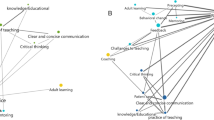Abstract
Interest in an oncology career has decreased among internal medicine residents completing an inpatient hematology-oncology rotation. Over years, our institutional data at Indiana University School of Medicine reflected lower satisfaction with the oncology inpatient ward rotation as compared to other rotations. We hypothesized that a switch from an inpatient ward rotation to a hybrid model of inpatient consultations and outpatient clinics would improve resident satisfaction with their educational experience in oncology. Over the 6-month periods preceding and following the change in rotation format, residents were asked to complete anonymous rotation evaluations and rate their experiences on a 5-point Likert scale (poor 1 to excellent 5). Areas assessed included patient load, educational value of patient mix, quality of didactics and teaching, quality of patient care delivery, adequacy of time for reading, and overall rotation quality. The hybrid oncology rotation was rated as significantly superior to the traditional ward format in six out of eight areas including patient load, educational value of patient mix, time for study, teaching quality, relevance of material, and overall rating. Improvements in the perceived quality of patient care delivery (p = 0.139) and quality of didactics (p = 0.058) were also observed without reaching statistical significance. The balance of inpatient and outpatient experiences with the hybrid rotation was highly rated (4.5 ± 0.5). The implementation of a hybrid oncology rotation was associated with perceived improvement in educational value, patient mix, and time for reflection and study without apparent compromise in the quality of patient care delivery.
Similar content being viewed by others
Data Availability
Data was generated using evaluations at Indiana University School of Medicine, Internal Medicine Residency Program. Derived data from the evaluations are available from the corresponding author on request.
Code Availability
Not applicable.
References
Loriot Y, Albiges-Sauvin L, Dionysopoulos D et al (2010) Why do residents choose the medical oncology specialty? Implications for future recruitment–results of the 2007 French Association of Residents in Oncology (AERIO) Survey. Ann Oncol 21(1):161–165
Nixon NA, Lim H, Elser C, Ko YJ, Lee-Ying R, Tam VC (2018) Oncology education for Canadian internal medicine residents: the value of participating in a medical oncology elective rotation. Curr Oncol (Toronto, Ont) 25(3):213–218
https://www.acgme.org/Specialties/Program-Requirements-and-FAQs-and-Applications/pfcatid/2/Internal%20Medicine. Accessed Dec 2020
McFarland DC, Kirkwood K, Maki RG (2014) Stress and empathy among internal medicine trainees on an inpatient hematology-oncology ward. J Clin Oncol 32(31_suppl):231
McFarland DC, Malone AK, Roth A (2017) Acute empathy decline among resident physician trainees on a hematology-oncology ward: an exploratory analysis of house staff empathy, distress, and patient death exposure. Psychooncology 26(5):698–703
McFarland DC, Roth A (2017) Resilience of internal medicine house staff and its association with distress and empathy in an oncology setting. Psychooncology 26(10):1519–1525
McFarland DC, Holland J, Holcombe RF (2015) Inpatient hematology-oncology rotation is associated with a decreased interest in pursuing an oncology career among internal medicine residents. J Oncol Pract 11(4):289–295
Cook MR, Graff-Baker AN, Moren AM et al (2016) A disease-specific hybrid rotation increases opportunities for deliberate practice. J Surg Educ 73(1):1–6
Author information
Authors and Affiliations
Contributions
Antoine Saliba, Cynthia Wei, Mitchell Goldman, Noelle Sinex, and Naveen Manchanda were involved in the study conception and design. Material preparation, data collection, and analysis were performed by Antoine Saliba, Jennifer King, and Reem Akel. The first draft of the manuscript was written by Antoine Saliba, and all authors commented on previous versions of the manuscript. All authors read and approved the final manuscript.
Corresponding author
Ethics declarations
Conflict of Interest
The authors declare no competing interests.
Additional information
Publisher's Note
Springer Nature remains neutral with regard to jurisdictional claims in published maps and institutional affiliations.
Prior Presentation/Publication
An abstract of this paper was presented at ASCO 2020. This paper has not been published—online or in print—and is not under consideration elsewhere.
Supplementary Information
Below is the link to the electronic supplementary material.
Rights and permissions
About this article
Cite this article
King, J.M., Akel, R., Saliba, A.N. et al. Innovation in Resident Core Oncology Education: Switching from an Inpatient Ward Rotation to a Hybrid Model of Inpatient Consultations and Outpatient Clinics. J Canc Educ 37, 1768–1772 (2022). https://doi.org/10.1007/s13187-021-02025-y
Accepted:
Published:
Issue Date:
DOI: https://doi.org/10.1007/s13187-021-02025-y




